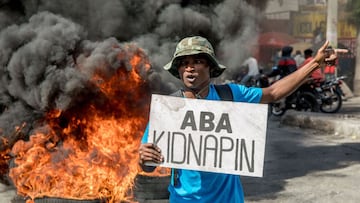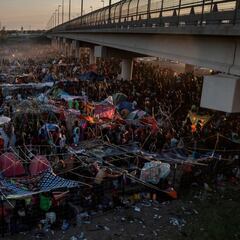Why is there a surge in kidnappings in Haiti?
A group of US missionaries on the Caribbean island were abducted on Saturday, and the growing number of kidnappings reflects the terrible state of Haiti in 2021.


In the first three quarters of 2021 there have been more than 600 reported kidnappings, compared to 231 over the same period in 2020 in Haiti. The latest is a group of US and Canadian missionaries, sponsored by the Ohio-based Christian Aid Ministries.
These latest kidnappings are a symptom of a society in total free-fall, one which has been subjected to some of the world's worst hardships in the last three decades.
What is the background of the kidnappers?
The group of between 15 and 17 people, including children, were being held by the '400 Mawozo' armed gang that for months has been engaged in theft and kidnappings in the area between Port-au-Prince and the border with the Dominican Republic, officials say.
The '400 Mawozo' gang normally demands a ransom. In April, it demanded $1m (£722,000) for the safe return of the Catholic clergy. It is yet unclear if any demands have been made for the return of the missionaries, but a former field director for Christian Aid Ministries in Haiti told CNN that the kidnappers have already made contact with the organization.
A gang in Haiti kidnapped 17 people linked to a U.S.-based missionary org, including 5 children.
— AJ+ (@ajplus) October 18, 2021
Gang violence in Haiti has displaced almost 20,000 people in recent months. Meanwhile, the U.S. has deported 7,000+ Haitians with a Trump policy that bypasses their asylum rights. pic.twitter.com/iXbBIknWx8
Armed gangs control the poorest neighborhoods in Port-au-Prince, leaving citizens and foreigners helpless against exploitation.
What is the current situation in Haiti?
In July the President, Jovenel Moïse, was assassinated by currently unknown perpetrators. Rumors have abounded about who could be involved, but so far nothing has been proven. While not the beginning of the crisis, the assassination reflects the great turmoil the country is facing.
From 1991 onwards Haiti has been mired in crisis after crisis. In 30 years there has been a coup d'état, a US invasion, then another coup against the government, which may have been organized by the US, followed by a devastating earthquake in 2010 have left the country in pieces.
The reinstatement of the democratically elected president in 1994 was contingent on Haiti agreeing to a series of IMF and World Bank deals to 'liberalize' its economy, which means to subject it to extreme foreign influence. Haiti was at the whim of foreign markets and began to import food that it was lacking, due to much of it being sold abroad as tariffs were lowered on trade.
In the '80s and '90s, the U.S. pressured Haiti to reduce tariffs on imported rice from 50 percent to 3 percent, in order to expand the market for subsidized Arkansas rice. Haiti's self-sufficient agricultural economy, which employed a majority of Haitians, was destroyed.
— Gravel Institute (@GravelInstitute) September 24, 2021
Related stories
“If you look at the [US invasion] now with hindsight, you can say that it was a major failure, it didn’t change Haiti, it didn’t democratize Haiti. If anything, the situation now is probably more catastrophic than it was in the mid-1990s… It was a euphoric moment, which ended in disaster”, says Robert Fatton, a Haitian-born historian who is now a professor in political science at the University of Virginia.
A nationwide general strike emptied the streets of Haiti's capital Port-au-Prince on Monday with organisers denouncing the rapidly disintegrating security situation highlighted by the kidnapping of American and Canadian missionaries at the weekend https://t.co/m7XaERzraF
— AFP News Agency (@AFP) October 18, 2021
The 2010 earthquake saw at least 100,000 people killed and much of the destruction is yet to be cleared. All of this was compounded by another earthquake in 2021 which has left Haiti the poorest nation in the western hemisphere. With such a dire economic outlook for the country, Haitians are willing to put everything on the line for a chance of a payout while their country is crumbling around them.

